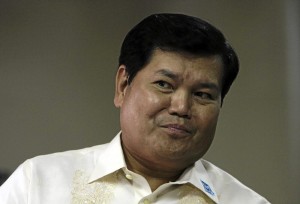BSP probing leakage of Corona’s bank records
The Bangko Sentral ng Pilipinas (BSP) is investigating the alleged leakage of documents pertaining to Chief Justice Renato Corona’s deposits with Philippine Savings Bank (PSBank) branch on Katipunan Avenue, Quezon City, Senate President Juan Ponce Enrile Thursday said.
Enrile made the announcement as senator-judges grilled PSBank president Pascual Garcia III on how prosecutors of the House of Representatives were able to obtain copies of the signature cards that Corona signed when he first opened an account with the branch.
House prosecutors sitting in the Senate session hall bristled and ribbed each other uncomfortably after Enrile’s disclosure.
The Senate President noted that the subpoena issued by the impeachment court to PSBank was “based on alleged documents anonymously given to the prosecution.”
“In fact we do not know these numbered accounts before they were supplied to us by the requesting prosecution panel and they (prosecutors) claim these came from an anonymous source,” Enrile said.
Article continues after this advertisement‘Small lady’
Article continues after this advertisementMindoro Oriental Representative Reynaldo Umali earlier told the court that a “small lady” handed over to him an envelope that contained Corona’s bank records.
The House prosecutor said he would not be able to identify the female, prompting Senator Vicente Sotto III to ask the sergeant at arms to check whether CCTV cameras in the building had recorded her visit at the time.
Enrile warned that the seemingly irregular method by which the documents were obtained “has a greater meaning to the nation and the integrity of its banking system.”
This is because the banking system treats records of all depositors as highly confidential papers.
Enrile also ordered Garcia to bring Annabelle Tiongson, the manager of PSBank Katipunan branch on Monday, apparently to explain the circumstances that led to the leak to prosecutors.
Enrile asked Garcia why Tiongson did not appear as a witness when she was the original subject of the subpoena issued to PSBank.
Garcia said Tiongson could not appear because she was “very stressed” for fear of “potential liabilities” that may include imprisonment if she violated bank secrecy laws.
In his first appearance Wednesday, Garcia told the court he was taking the cudgels for other employees and officials of PSBank who may be criminally prosecuted for information they would reveal to senator-judges.
Senator Jose “Jinggoy” Estrada stood up to ask Garcia at one point whether Tiongson would be the person that Umali referred to.
Garcia said it would not be possible since Tiongson is tall.
Last week, the prosecution panel submitted a supplemental request for subpoena where it attached photocopies of Corona’s signature cards, passport identification and the “application-and agreement-for-deposit account” that the Chief Justice supposedly signed when he opened his first account.
Garcia refused to confirm whether the copies of Corona’s PSBank records attached to the prosecution’s request for subpoena were genuine.
He said the PSBank had also done its own “review” of the incident, adding he suspects the copies “floating around (did) not come from the bank.”
“So where did they come from? Heaven? Would a fly or rat or cockroach come to your office?” Enrile said.
Garcia noted that the documents shown to him were “facsimiles” of original bank documents and bear “differences” compared with those issued by the bank.
“The court was informed about the manner of this leak and the release of this document. You better be candid with us. If you (would not), we would be forced to apply the rules of this court (to you),” Enrile said.
5 dollar accounts
Still, Enrile was able to elicit an admission from Garcia that the 10 bank accounts—five peso and five dollar accounts—that were the subject of the subpoena requested by prosecutors indeed exist.
However, Garcia refused to admit this despite Enrile’s intensive grilling that the leaked documents obtained by the prosecutors came from the PSBank Katipunan branch.
Senator Franklin Drilon said that under the know-your-client procedure, the bank was obliged to obtain Corona’s personal circumstances such as his reason for opening an account.
“In this case, did you ask where the dollars came from? You did mention that the dollar accounts exist?” he reminded Garcia.
The bank president, however, refused to reveal any details about Corona’s dollar accounts, insisting the Foreign Currency Deposit Act barred him from doing so.
Senator Alan Peter Cayetano noted that in the landmark decision of the Supreme Court in the Salvacion case, the tribunal allowed the garnishment of the dollar account of a foreigner accused of raping a Filipino woman so she could receive damages.
“While the law is clear that a dollar account (cannot be scrutinized) but the Supreme Court said that in the interest of justice, it would be unjust to rape a Filipina and not pay damages when there is a dollar account. The makers of the law would not have intended injustice,” Cayetano said.
He added that the charges of corruption, betrayal of public trust and culpable violation of the Constitution were tantamount to the “rape of the Philippines.”
“I cannot relate the (Salvacion) case to this particular issue,” Garcia said.
The witness pointed out that the Supreme Court order “issued to garnish, but not to look at the account, just to get the deposits in the account to compensate the victim who had been given a just compensation by the court. The foreigner had already been convicted.”
Cayetano replied that if the Supreme Court could make an exception of the Salvacion case, the impeachment court could also grant the same exception to PSBank sources who cooperate in the trial.
“Honestly, I think I would be breaking the law,” the bank president said.
